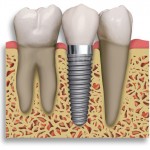Dental implants are becoming an increasingly popular option for replacing missing teeth. Traditionally, dentists have relied upon bridgework or dentures to replace teeth that have been lost. Implants have advantages over other methods but are more expensive. Ask your periodontist if dental implants are the right choice for you.
Is your implant dentist a board certified specialist?
Any dentist with a dental degree can legally place an implant. Periodontal specialists complete two to three years of residency training after their four years of dental school. During residency, they are trained in surgical skills and procedures and the research-based knowledge supporting that treatment. The successful applicant receives a certificate or diploma in their specialty. The Periodontal specialist can then pursue becoming a Board-certifed Periodontist. This is a three year process that involves multiple tiers of rigid examinations to ensure that the highest standards are met. Once this rigorous testing is passed before the specialty board, the Periodontist is then Board-certified and receives Diplomate status in their specialty. Only about 2,000 periodontists have achieved Diplomate status since 1939. The recognized standard-setting organization for Periodontists is the American Board of Periodontology.
How long has your dentist been placing dental implants?
Implant technology has improved greatly in the last few years making them easier to place. Many dentists are now starting to place implants without the advantage of extensive training nor clinical experience.
How many implants does your dentist place a year?
You want to be assured that the dentist that places your dental implants is experienced and knowledgeable in handling the most routine implant procedures, as well as the most complex implant procedures. There is a difference between someone who places 15 implants a year vs. someone who places hundreds a year.
What training has your dentist had in dental implants?
As frightening as it may seem, many dentists today are taking one or two day courses on implants, working on plastic model jaws then buying surgical implant kits to get started in dental implant placement.
Can you see a list of the continuing education courses that your dentist has taken in the past 12-24 months?
All state licensing boards attempt to establish minimum standards of practice for dental practitioners. Despite the efforts of the licensing boards, this does not guarantee that your dentist is qualified to perform specialty surgical procedures, especially when it comes to placing dental implants. A dentist that actively pursues continuing education in implants is passionate about implants and committed to learning the latest techniques and refining and updating their treatment skills to provide excellence in implant care.
Advantages
Weigh the advantages of dental implants against less-expensive methods of replacing your teeth. Dental implants have the distinct advantage of looking and functioning like your natural teeth. Ask your periodontist about your risk of bone atrophy. Another important benefit is that implants can stop the atrophy of your jawbone, which normally occurs after you lose a tooth. Dental implants can also improve your appearance and enhance your ability to chew.
Procedure
Ask your dentist how many visits you will require and when your work will be completed. The process takes months to complete because titanium implants must be allowed time to fuse with your jawbone before the crowns can be attached. If you need multiple implants, it might be a year before treatment is complete.
Ask your periodontist about pain relief, especially if you have dental anxiety. Local anesthesia is typically used and your dentist may send you home with pain relievers for use after the procedure.
Ask about maintenance for your implants. Find out how often your implants will need to be checked, what could go wrong with them and how much repairs might cost.
Expense
Determine the exact cost before beginning the procedure. Dental implants are expensive. The procedure could cost anywhere from $1,000 to $25,000. The price varies among dentists, but the largest variable will be the extent of dental work you individually require. There are several factors to consider–cost of the surgery itself, cost of the titanium implant, cost of the crown placed over the implant and total number of crowns and implants you need. If your jawbone has already shrunk, you may need synthetic bone material implanted also. Get a cost estimate in writing before you agree to the surgery. Ask if the dental office offers financing options. Find out if your dental insurance will cover part of the fees.
Risks
Ask about the risks of dental implant surgery. All medical procedures carry some degree of risk. Being made of titanium and not biological matter, implants do not cause rejection problems associated with tissue implants. They do carry a risk of infection, however. There could also be injury to surrounding teeth, gums or blood vessels. You could be left with permanent nerve damage that results in tingling or numbness around your mouth and face. There is also a risk of chronic sinus problems if an implant enters a sinus cavity. Ask your dentist about any increased risk you may have because of your medical conditions, such as diabetes or heart disease. Be sure to give your periodontist a complete medical history because some health conditions may disqualify you for dental implants.


